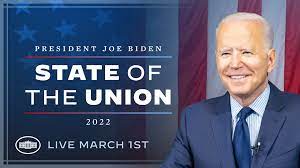The State of the Union on Mental Health
The MIND 24-7 Team | April 24, 2023
MIND 24-7’s CEO responds to President Biden’s Strategy to Address Our National Mental Health Crisis
EXERT FROM WHITE HOUSE FACT SHEET: Our country faces an unprecedented mental health crisis among people of all ages. Two out of five adults report symptoms of anxiety or depression. And, Black and Brown communities are disproportionately undertreated – even as their burden of mental illness has continued to rise. Even before the pandemic, rates of depression and anxiety were inching higher. But the grief, trauma, and physical isolation of the last two years have driven Americans to a breaking point.

Our youth have been particularly impacted as losses from COVID and disruptions in routines and relationships have led to increased social isolation, anxiety, and learning loss. More than half of parents express concern over their children’s mental well-being. An early study has found that students are about five months behind in math and four months behind in reading, compared with students prior to the pandemic. In 2021, More than 40% of high school students experienced depressive symptoms in the past year, 18% of female students experienced sexual violence, and 22% of LGBQ+ students attempted suicide.. Emergency department visits for attempted suicide have risen 51 percent among adolescent girls.
This youth mental health crisis has been accentuated by large social media platforms, which for years have been conducting a national experiment on our children and using their data to keep them clicking—with enormous consequences. While technology platforms have improved our lives in some ways, there is mounting evidence that social media is harmful to many kids’ and teens’ mental health, well-being, and development. As the Surgeon-General has said, “when not deployed responsibly and safely, these tools can pit us against each other, reinforce negative behaviors like bullying and exclusion, and undermine the safe and supportive environments young people need and deserve.” In the State of the Union, the President will call on Congress to strengthen privacy protections, ban targeted advertising to children, and demand technology companies stop collecting personal data on our children.
Jeff Spight, MIND 24-7’s Co-Founder and CEO shared his comments on The White House’s SOTU address this week:

“While President Biden discussed a number of important topics in his State of the Union address, the one line that speaks to the purpose and vision behind MIND 24-7 is getting ‘all Americans the mental health services they need’.
We see that providing immediate access to high-quality care regardless of the level of care you need, current health insurance coverage, or age/socioeconomic status is the most crucial component of making the goal an achievable target.
We are proud to work closely with our fellow providers, health plan partners, and first responders to serve the community in this way and look forward to expanding our unique solutions to more areas across the country.”
The 3 Steps to the White House Plan
“A national mental health strategy to strengthen system capacity, connect more Americans to care, and create a continuum of support –transforming our health and social services infrastructure to address mental health holistically and equitably.”
- Strengthen System Capacity a. Invest in proven programs that bring providers into behavioral health. b. Pilot new approaches to train a diverse group of paraprofessionals c. Build a national certification program for peer specialists. d. Promote the mental well-being of our frontline health workforce. e. Launch the “988” crisis response line and strengthen community-based crisis response. f. Expand the availability of evidence-based community mental health services. g. Invest in research on new practice models.
- Connect Americans to Care a. Expand and strengthen parity. b. Integrate mental health and substance use treatment into primary care settings. c. Improve veterans’ access to same-day mental health care. d. Expand access to tele- and virtual mental health care options. e. Expand access to mental health support in schools and colleges and universities. f. Embed and co-locate mental health and substance use providers into community-based settings. g. Increase behavioral health navigation resources.
- Support Americans by Creating Healthy Environments a. Strengthen children’s privacy and ban targeted advertising for children online. b. Institute stronger online protections for young people, including prioritizing safety by design standards and practices for online platforms, products, and services. c. Stop discriminatory algorithmic decision-making that limits opportunities for young Americans. d. Invest in research on social media’s mental harms. e. Expand early childhood and school-based intervention services and supports. f. Set students up for success. g. Increase mental health resources for justice-involved populations. h. Train social and human services professionals in basic mental health skills
